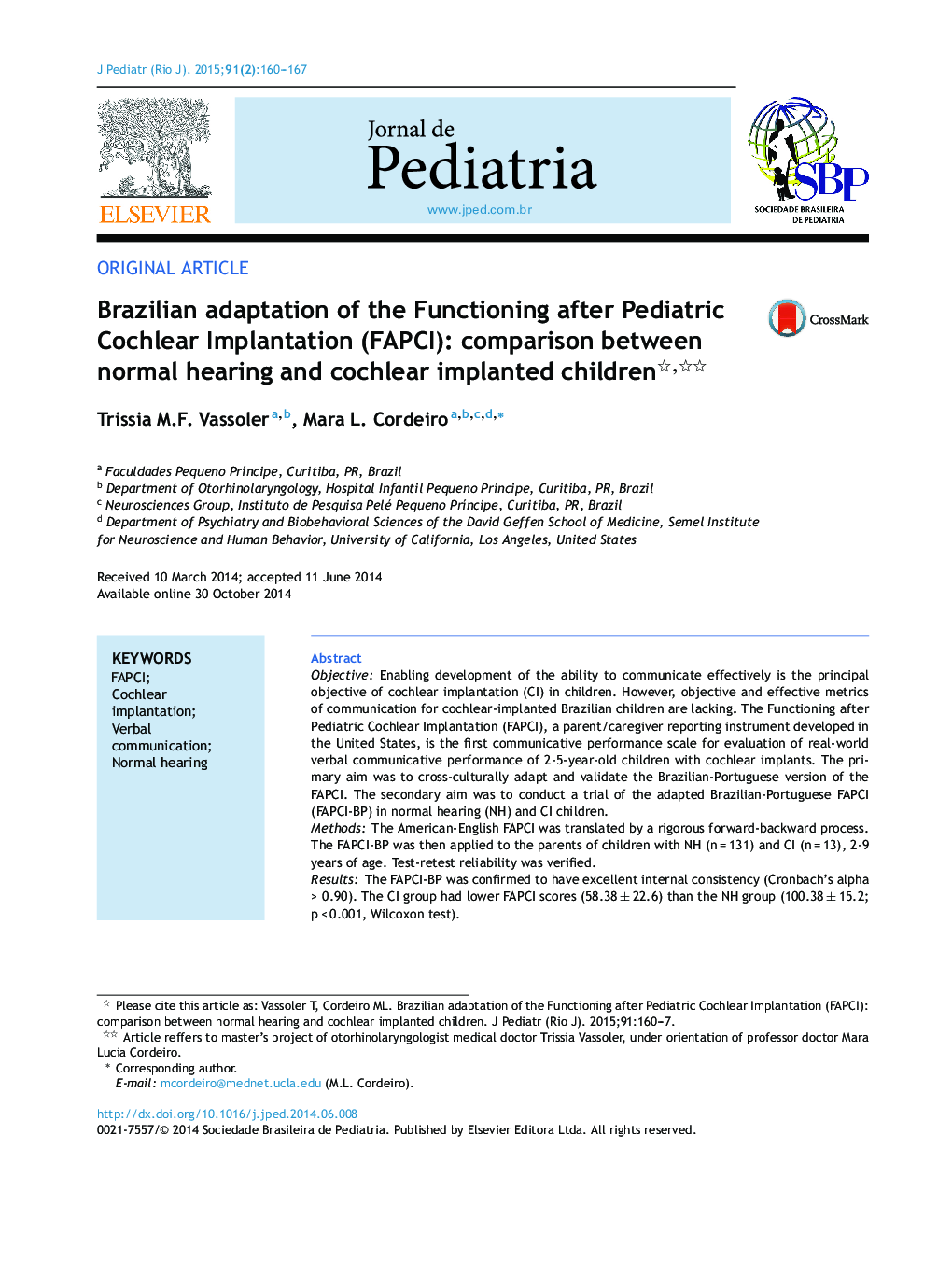| Article ID | Journal | Published Year | Pages | File Type |
|---|---|---|---|---|
| 4153971 | Jornal de Pediatria | 2015 | 8 Pages |
ObjectiveEnabling development of the ability to communicate effectively is the principal objective of cochlear implantation (CI) in children. However, objective and effective metrics of communication for cochlear-implanted Brazilian children are lacking. The Functioning after Pediatric Cochlear Implantation (FAPCI), a parent/caregiver reporting instrument developed in the United States, is the first communicative performance scale for evaluation of real-world verbal communicative performance of 2-5-year-old children with cochlear implants. The primary aim was to cross-culturally adapt and validate the Brazilian-Portuguese version of the FAPCI. The secondary aim was to conduct a trial of the adapted Brazilian-Portuguese FAPCI (FAPCI-BP) in normal hearing (NH) and CI children.MethodsThe American-English FAPCI was translated by a rigorous forward-backward process. The FAPCI-BP was then applied to the parents of children with NH (n = 131) and CI (n = 13), 2-9 years of age. Test-retest reliability was verified.ResultsThe FAPCI-BP was confirmed to have excellent internal consistency (Cronbach's alpha > 0.90). The CI group had lower FAPCI scores (58.38 ± 22.6) than the NH group (100.38 ± 15.2; p < 0.001, Wilcoxon test).ConclusionThe present results indicate that the FAPCI-BP is a reliable instrument. It can be used to evaluate verbal communicative performance in children with and without CI. The FAPCI is currently the only psychometrically-validated instrument that allows such measures in cochlear-implanted children.
ResumoObjetivoO principal objetivo do implante coclear (IC) em crianças é permitir o desenvolvimento da capacidade de se comunicar efetivamente. Contudo, não há objetivo nem parâmetros efetivos de comunicação para crianças brasileiras com o implante coclear. O Functioning after Pediatric Cochlear Implantation (FAPCI), instrumento de relato dos pais/prestadores de cuidados desenvolvido nos Estados Unidos, é a primeira escala de desempenho para avaliação do desempenho comunicativo verbal no mundo real de crianças de 2-5 anos de idade com implantes cocleares. Nosso principal objetivo era adaptar e validar a versão do FAPCI em português do Brasil de forma transcultural. Nosso objetivo secundário era realizar um teste da versão do FAPCI adaptada para o português do Brasil (FAPCI-PB) com grupos de crianças com audição normal (AN) e IC.MétodosO FAPCI em inglês norte-americano foi traduzido por um processo rigoroso de tradução e retrotradução. O FAPCI-PB foi, então, aplicado aos pais das crianças com AN (N = 131) e IC (N = 13) de 2-9 anos de idade. Foi verificada a confiabilidade da reaplicação do teste.ResultadosConfirmou-se que o FAPCI-PB tem excelente coerência interna (alfa de Cronbach > 0,90). O grupo com IC apresentou menores pontuações no FAPCI (58,38 ± 22,6) que o grupo com AN (100,38 ± 15,2; p < 0,001, teste de Wilcoxon).ConclusãoEsses resultados indicam que o FAPCI-PB é um instrumento confiável. Pode ser utilizado para avaliar o desempenho comunicativo verbal em crianças com e sem IC. O FAPCI é, atualmente, o único instrumento validado psicometricamente que possibilita essas medições em crianças com implante coclear.
